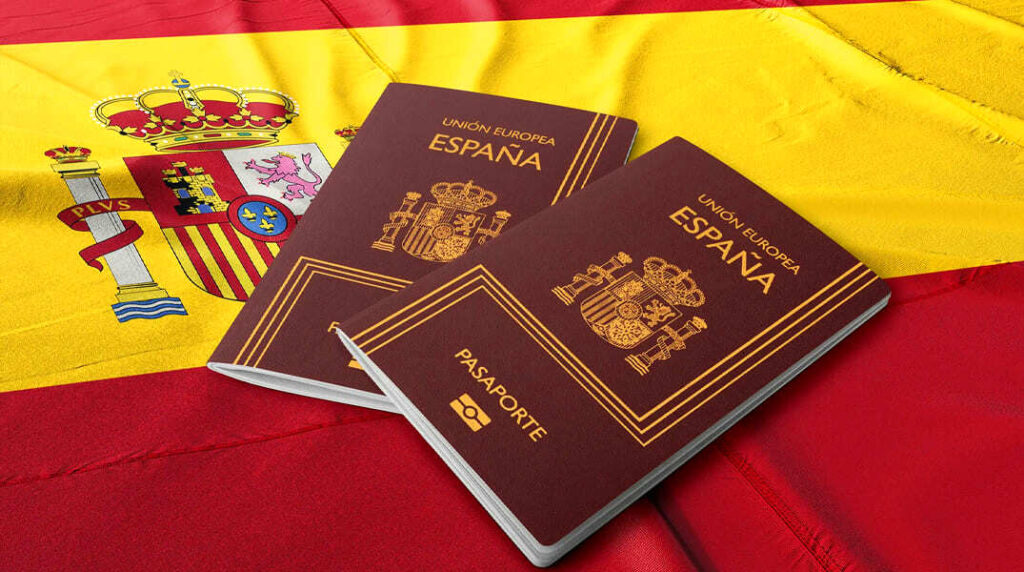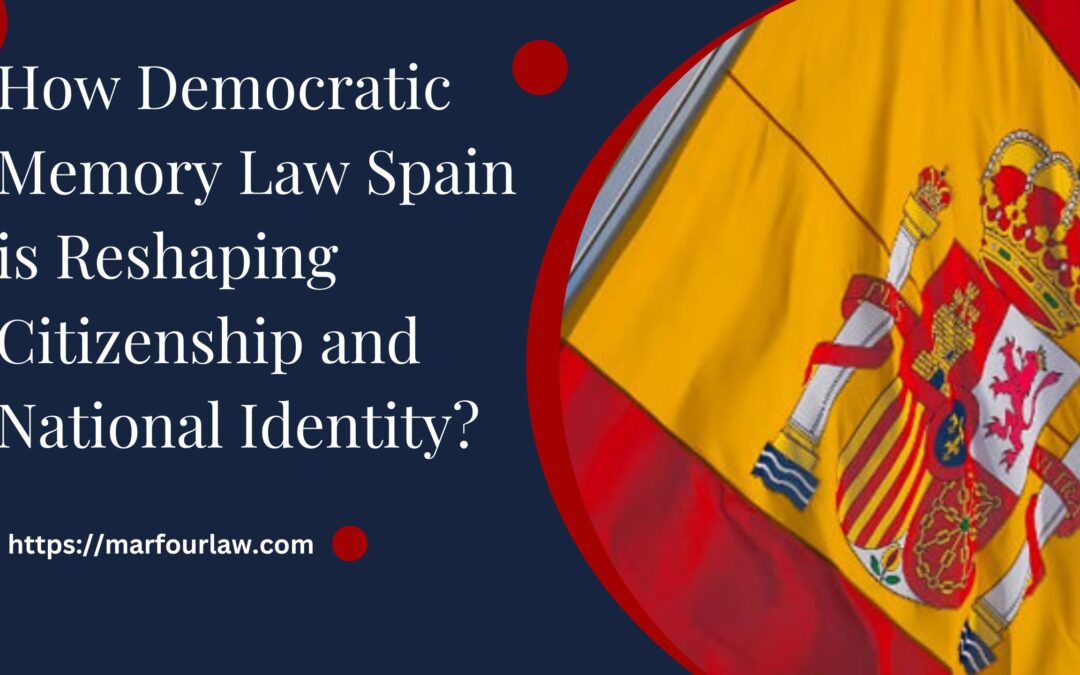The Democratic Memory Law Spain is a crucial legal framework aimed at acknowledging and remedying the injustices of Spain’s past, especially those related to the Spanish Civil War and Francoist dictatorship. For many families with Spanish ancestry, this law opens a path to reclaim their Spanish citizenship, particularly for descendants of those who were forced into exile. As this law reshapes national identity and rights for many, it is essential to understand its impact, especially if you are exploring Spain’s citizenship opportunities. At Marfour International Law Firm, we break down the key elements of this law to guide you through your citizenship journey.
Democratic Memory Law Spain and Its Importance
The Democratic Memory Law holds deep significance for Spain’s democratic fabric. It represents the nation’s ongoing efforts to face its historical past and acknowledge the suffering endured under Franco’s dictatorship.
Restoring Historical Memory
The law is designed to restore historical memory by recognizing the crimes and injustices committed during the Civil War and the Franco era. This restoration includes honoring those who were persecuted, imprisoned, or executed, and acknowledging the trauma endured by the exiled families.
Legal Rehabilitation of Victims
The law allows for the legal rehabilitation of individuals wrongfully prosecuted or convicted under Franco’s regime. These rehabilitations not only bring justice to the victims but also ensure that their descendants can reclaim their family’s rightful place in Spain’s national story.
Promotion of Democratic Values
Through educational reforms and the removal of public symbols glorifying the Franco regime, the law promotes democratic values, reinforcing Spain’s commitment to human rights and its future as a democracy.
Law’s Impact on Spanish Citizenship
One of the most far-reaching impacts of the Democratic Memory Law is its provision for individuals of Spanish descent, particularly those whose ancestors were exiled or persecuted during Franco’s dictatorship.
Citizenship for Descendants of Exiles
The law grants citizenship to descendants of those exiled during the Franco era. If you are a Spanish grandchild, this law would allow you to reconnect with your Spanish heritage by reclaiming your family’s nationality.
Does Spain Allow Dual Citizenship?
A common question is whether Spain allows dual citizenship. While Spain generally does not permit dual citizenship, there are exceptions, especially for individuals from Spanish-speaking countries or those affected by this law. The Democratic Memory Law provides an avenue for those reclaiming citizenship to maintain their current nationality while acquiring Spanish citizenship.
How Spanish Grandchildren Can Reclaim Citizenship?
If you are the grandchild of Spanish nationals, you may have the opportunity to reclaim Spanish citizenship. Spain has created ways for descendants of Spanish citizens to restore their connection to the country, giving many the chance to gain citizenship. Here’s what you need to know about the process.

Law of Historical Memory
Spain introduced the Law of Historical Memory in 2007, addressing the loss of citizenship by those who had to leave the country during the Spanish Civil War and Franco’s dictatorship. This law allows the grandchildren of Spanish exiles to seek Spanish citizenship. The initiative was expanded in 2022 with the Democratic Memory Law, often referred to as the “Grandchildren Law,” which further supports descendants of those who were exiled.
Who Can Apply?
To be eligible, you need to meet a few key requirements. You can apply if you:
- Are a direct descendant, specifically a grandchild, of a Spanish citizen who was exiled.
- Have proof of your grandparent’s Spanish nationality and documentation of their exile.
- Can provide necessary records that tie you to your Spanish ancestry, such as birth certificates or family documents.
Documents Needed for the Process
Once you confirm your eligibility, you’ll need to gather several important documents. These usually include:
- Your birth certificate.
- Your grandparent’s Spanish birth certificate or passport.
- Proof of their exile, such as immigration or refugee documents.
- Your parents’ birth certificates to establish a clear lineage.
It’s important to ensure all documents are properly translated into Spanish if necessary. The more complete your application, the smoother the process will be.
Application Submission
After gathering the required documents, the next step is submitting your application. You’ll need to submit it to the local Spanish consulate or embassy. It’s important to ensure that all documents are accurate and in order, as this will help avoid delays. In some cases, you may also need to attend a brief interview.
Achieving in Spanish Citizenship Through the Law
The process of achieving Spanish nationality under this law is detailed and requires meeting specific legal criteria.
Eligibility Criteria for Citizenship
To qualify for citizenship, you must provide evidence that your ancestors were affected by Franco’s regime. This includes proof of exile or persecution. Grandchildren of Spaniards who were stripped of their nationality or forced into exile are eligible to apply.
Application Process
Once you have gathered the necessary documents, you can apply for citizenship. The process involves submitting proof of your descent, records of your family’s history, and documents confirming your Spanish heritage. This can be a lengthy but rewarding process for those wishing to reconnect with Spain.
Legal Assistance for Application
While the application process is open to all eligible individuals, many opt for legal assistance to ensure their case is well-prepared and all documentation is properly submitted. This ensures a smoother process in achieving Spanish citizenship.
Benefits of Dual Citizenship
Having dual citizenship comes with several advantages, especially when you hold passports from countries like Spain. If you’re considering reclaiming your Spanish citizenship or acquiring another, here’s a look at some of the benefits you can enjoy.

Freedom of Travel
One of the most immediate perks of dual citizenship is increased freedom of travel. With two passports, you often have more countries you can visit visa-free or with simplified entry requirements. For example, Spanish citizens can travel freely within the European Union and the Schengen Area, making travel between EU countries a breeze. If you hold another passport as well, this expands your global travel options even further.
Access to Social Services
Dual citizenship allows you to benefit from the social services offered in both countries. As a Spanish citizen, you gain access to Spain’s renowned healthcare system, which is one of the best in Europe. You also enjoy the right to education, social security benefits, and pension schemes. Having access to two countries’ systems offers security and wider support for your well-being.
Property Ownership and Investments
In some countries, only citizens are allowed to buy property or make certain types of investments. With dual citizenship, you have the right to purchase homes or invest in both countries. In Spain, for example, citizenship makes the process of buying property more straightforward, without the additional paperwork required for foreigners. This can be especially beneficial for those looking to expand their financial portfolio or settle in another country later in life.
Employment Opportunities
Dual citizenship can open doors to job opportunities that would otherwise be restricted. In Spain and the EU, citizens have the right to live and work in any member state without needing special permits. This allows you to explore job markets across Europe. On the other hand, your second citizenship may also provide similar work opportunities in other parts of the world, giving you a broader range of career options.
Cultural and Heritage Connections
For many, dual citizenship is a way to reconnect with their family heritage. Being a citizen of two countries allows you to maintain stronger cultural ties with both, participate in traditions, and pass on that heritage to future generations. It can also provide a deeper sense of belonging in both places, letting you experience the best of both worlds.
FAQs
To clarify some of the most commonly asked questions related to this law, here are a few key points:
Does Spain allow dual citizenship under the Democratic Memory Law?
Yes, Spain allows dual citizenship under certain circumstances, particularly for descendants of Spaniards who were exiled or stripped of their nationality during Franco’s rule.
Who qualifies for citizenship under this law?
Grandchildren of exiled Spaniards or those who lost their nationality due to political persecution may qualify for citizenship.
What documents are required to apply for citizenship?
You will need birth certificates, proof of exile or persecution, and other family documentation that demonstrates your connection to Spain.
Conclusion
The Democratic Memory Law Spain marks a monumental effort to address the country’s dark past and restore justice to the victims of the Franco regime. For descendants of Spanish exiles, particularly Spanish grandchildren, it provides an opportunity to reclaim their heritage and, in many cases, to apply for Spain dual citizenship. Whether through legal reform, educational initiatives, or the removal of Francoist symbols, this law helps shape Spain’s future by acknowledging its historical struggles and reinforcing its democratic values. For those seeking to reconnect with Spain, this law offers a significant pathway.

